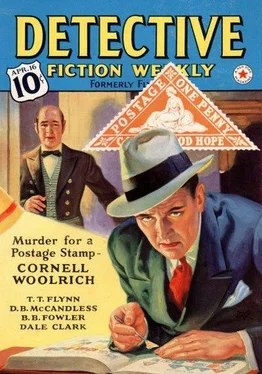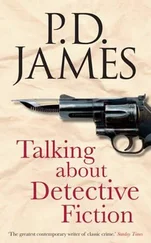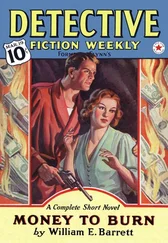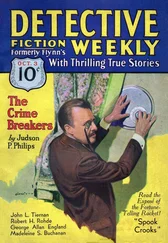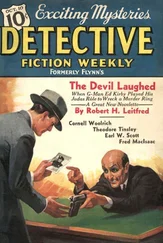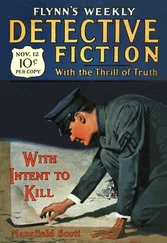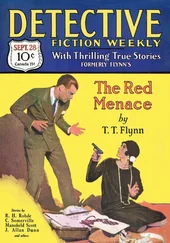Лоуренс Трит - Detective Fiction Weekly. Vol. 118, No. 6, April 16, 1938
Здесь есть возможность читать онлайн «Лоуренс Трит - Detective Fiction Weekly. Vol. 118, No. 6, April 16, 1938» весь текст электронной книги совершенно бесплатно (целиком полную версию без сокращений). В некоторых случаях можно слушать аудио, скачать через торрент в формате fb2 и присутствует краткое содержание. Город: New York, Год выпуска: 1938, Издательство: The Red Star News Company, Жанр: Детектив, на английском языке. Описание произведения, (предисловие) а так же отзывы посетителей доступны на портале библиотеки ЛибКат.
- Название:Detective Fiction Weekly. Vol. 118, No. 6, April 16, 1938
- Автор:
- Издательство:The Red Star News Company
- Жанр:
- Год:1938
- Город:New York
- ISBN:нет данных
- Рейтинг книги:3 / 5. Голосов: 1
-
Избранное:Добавить в избранное
- Отзывы:
-
Ваша оценка:
- 60
- 1
- 2
- 3
- 4
- 5
Detective Fiction Weekly. Vol. 118, No. 6, April 16, 1938: краткое содержание, описание и аннотация
Предлагаем к чтению аннотацию, описание, краткое содержание или предисловие (зависит от того, что написал сам автор книги «Detective Fiction Weekly. Vol. 118, No. 6, April 16, 1938»). Если вы не нашли необходимую информацию о книге — напишите в комментариях, мы постараемся отыскать её.
Detective Fiction Weekly. Vol. 118, No. 6, April 16, 1938 — читать онлайн бесплатно полную книгу (весь текст) целиком
Ниже представлен текст книги, разбитый по страницам. Система сохранения места последней прочитанной страницы, позволяет с удобством читать онлайн бесплатно книгу «Detective Fiction Weekly. Vol. 118, No. 6, April 16, 1938», без необходимости каждый раз заново искать на чём Вы остановились. Поставьте закладку, и сможете в любой момент перейти на страницу, на которой закончили чтение.
Интервал:
Закладка:
And even if he cleared it, he might easily break a leg when he struck the waste-rock yard on the other side of the fence.
He crouched. The muscles in his calves bulged in an effort to grip the metal underfoot. He relaxed deliberately. He inhaled deeply, swung his arms twice, and jumped.
The fence seemed to come right up at his face. But he was over it with a breathtaking inch to spare. He struck the rock, stumbled, and rolled over; sat up with his fists filled with small, sharp stones.
He drew a deep breath of relief and got to his feet again. The palm of his right hand smarted with painful lacerations. A trickle of blood ran warmly down one kneecap, exposed where the trouserleg had been torn across.
Stan gripped the gun in one hand, the flashlight in the other. He strode to the deeper shadows along the wall of the plant, and followed the wall until he came to the main door. It was unlocked.
The darkness inside was warmer, and very silent. And he listened carefully, without hearing a sound. Stan knew the layout of the plant only vaguely. The wing to his left housed the offices. The central and right portions of the building contained the machinery, but which departments were which he had no idea.
Stan turned right, toward the groan and the flicker of light...
He was in a corridor, one with a rubber-matted floor. He did not use the flashlight; did not dare to. A vague gray oblong in the distance was his only guide. He supposed it to be a window at the end of the corridor. When he reached it, he would also have reached the right wing of the gigantic plant.
Stan stopped in front of this window. His eyes had grown accustomed to the darkness. He could at least see that he had come out into a second corridor, at a right angle to the first. But the place remained as silent as a tomb.
This silence became menacing, as he thought of it. Where was the watchman? What had happened to Judge Elmore? And whoever was responsible for the groan and that flicker of light at the window? There flashed into Stan’s mind the picture of another man waiting in this silence — waiting in ambush.
It began to look as if he had risked his neck for nothing. Certainly he would accomplish nothing by blundering ahead into the darkness. But neither could he use the flashlight; it would only betray his presence, perhaps make a target of him.
He thought for a moment, and then groped in his pocket until he found a half dollar. His muscular fingers set the coin a-spinning on the window sill.
The half dollar made scarcely any sound at first. Stan tiptoed along the corridor. He flattened himself against the wall as the coin stopped spinning on its rim — keeled over — and gave its prolonged silvery ring.
Now, a footstep.
A door on the other side of the corridor opened. A ray of white light sprang from the opening. It passed the sill, where the half dollar was ringing its final note, and probed that end of the hall.
Stan’s grip tightened on the butt of the .38 — the hard rubber was slick with blood from his lacerated palm. To see him, the other would have to open the door wider.
Instead, the door slowly closed.
Was this a trick? Stan had to chance it. He went forward, shifted the flashlight so that he held it between his biceps and chest, and dropped his left hand to the doorknob. This kept his right arm and the gun free for action.
He tugged gently at the knob. He was not so much afraid of a squeaking hinge here as of a sudden, warning draught of air.
A faint whitish glow appeared. He waited, watched, with the door only inches open. The faint light was motionless, and certainly not pointed in his direction. Reassured, he heeled the door another half foot and knifed his lean figure through the opening.
He could see now that the white glow emanated from an electric torch. The torch itself was out of sight behind a stack of wooden packing boxes, but its area of illumination reached to the opposite wall. There was light enough to see that he had come into Randt’s shipping department.
Some wooden boxes and a greater number of cardboard cartons were ranged across the concrete floor. The cartons bore the Randt label, and prominent stickers that said, Fragile! Use No Hooks!
With the flashlight again in his left hand, Stan started across the floor. He followed a tier of the cardboard cartons, came out behind the electric torch.
The torch lay across a packing box. Its owner had his back turned to Stan. Both his arms were buried to their elbows in the wooden box.
Stan Baxter’s brows lifted in mute surprise.
“Seventy-four.” the man was whispering under his breath. “Seventy-five, six, seven.” A faint rustle of paper accompanied the count.
Stan said sharply: “You’re covered, mister!”
The other man grunted, and then rather slowly turned around. Stan’s gaze searched the face which was thus revealed to him.
It was a plumpish face, well fed and closely shaved. It was also a very fair-skinned face. Stan got an impression of large blue eyes under the blondest of brows. A felt hat, pushed high up from the forehead, let several strands of stringy, tow-colored hair fall across the man’s forehead.
The other features were present, but unimportant. He was neither strikingly handsome nor markedly ugly. He was neither very fat nor very thin: not tall and not short. His clothes seemed ordinary, neither ragged nor stylish.
In short, there was only one thing noticeable about him. He was blond. And not just an ordinary blond, but remarkably and memorably so. His pale coloring gripped the eye. It caused him to stand out like one white canary among a thousand yellow songsters.
The two men faced each other for a long moment, neither speaking. During that moment, Stan remembered Lieutenant Andreason’s skepticism because Lois Callum could not give a better description of the mysterious caller. Rut it had really been an excellent description. Trained operative that he was, Stan could not have improved on the girl’s simple phrase, “a blond man.”
The blond man broke the silence.
“You can put away your gun,” he said quietly. “I’m not a criminal.”
“Yeah. What are you?”
The other shrugged. “I’ll explain that to the proper authorities.”
“Your mistake, my friend,” said Stan. “You’ll explain it to me.”
“No, sir.” The blond man was unfrightened and thoroughly businesslike. “You’ll have to call the police. I won’t offer any resistance, I promise. But on the other hand, I refuse to say anything to you — or anyone else connected with the Randt company. And that’s another promise.”
Stan Baxter said, “Raise the hands, mister.”
He slapped a hand over the other’s garments.
“You see,” said the blond man, “I am unarmed.”
Stan grunted, reached into the man’s inner coat pocket. He drew out a brown leather wallet. The blond man made a gesture of protest; said, “You’ve no right to—”
Stan’s eyes widened over the wallet’s identification card. “Good Lord!”
The blond man nodded. “Yes. My name’s George Worthington. I’m an investigator for the Federal Trade Commission.”
Chapter XIII
Pieces of Glass
Stan Baxter echoed, “The Federal Trade Commission!” He regarded the blond man with considerable respect. The Federal Trade Commission, to the average newspaper reader, would mean little — just another vaguely familiar arm of the United States Government — in fact, not even an arm, but only one of Uncle Sam’s little fingers. FTC — it didn’t sound very glamorous. Probably another of those alphabetical agencies. A gang of long-haired economists poring over charts and graphs. A bunch of people with soft jobs.
But Stan knew better. His law schooling had given him an insight into the workings of the Commission. It was the watchdog, the umpire of American business. It maintained headquarters in Washington, with field offices in New York, Chicago, Seattle, and San Francisco. Its staff, over five hundred strong, was constantly on the alert to squelch fraud and deception.
Читать дальшеИнтервал:
Закладка:
Похожие книги на «Detective Fiction Weekly. Vol. 118, No. 6, April 16, 1938»
Представляем Вашему вниманию похожие книги на «Detective Fiction Weekly. Vol. 118, No. 6, April 16, 1938» списком для выбора. Мы отобрали схожую по названию и смыслу литературу в надежде предоставить читателям больше вариантов отыскать новые, интересные, ещё непрочитанные произведения.
Обсуждение, отзывы о книге «Detective Fiction Weekly. Vol. 118, No. 6, April 16, 1938» и просто собственные мнения читателей. Оставьте ваши комментарии, напишите, что Вы думаете о произведении, его смысле или главных героях. Укажите что конкретно понравилось, а что нет, и почему Вы так считаете.
